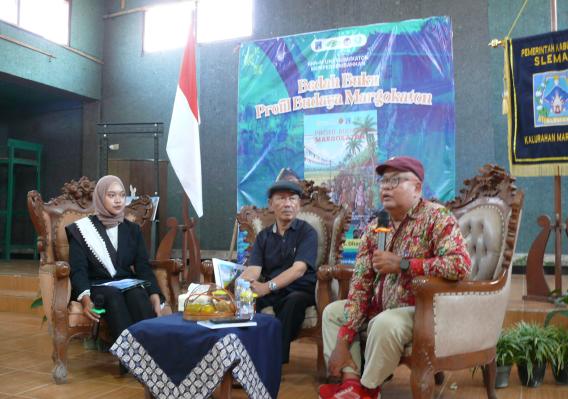Book Discussion of “Profil Budaya Margokaton”: Exploring the Potential and Accelerating the Heritage of a Cultural Village

On Tuesday (2 September 2025), the hall of the Margokaton Village Office (Balai Kalurahan Margokaton), Seyegan, Sleman was filled with a spirit of togetherness during the book discussion event of Profil Budaya Margokaton. The event was organized in collaboration between the KKNM 24308 team from Padukuhan Susukan 1 and the Government of Kalurahan Margokaton. Two key speakers attended: Drs. Dhanu Priyo Prabowo, M.Hum., who discussed the theme “Tracing the 10 Components of Cultural Potential of Margokaton Village”, and Transpiosa Riomandha, M.A., who addressed “Acceleration of the Cultural Heritage of Margokaton Village”.
Lurah Margokaton, Anggit Bimanyu, S.P., in his remarks expressed high appreciation for the event. He noted that the book Profil Budaya Margokaton, compiled by Agus Suprihono, Kasan Kurdi and Mei Anjar Wintolo, is not only a documentation of local identity but also a valuable asset for future generations. “Margokaton has riches of tradition, arts, and noble values that need to be preserved and inherited. The presence of this book also serves as a reminder that village development is not just about physical infrastructure, but also cultural preservation,” he said.
In his presentation, Dhanu Priyo Prabowo emphasized the ten cultural-potential components of Margokaton as outlined in the book: history, customs, arts, language, literature, traditional games, crafts, culinary, local wisdom, and tourism potential. He described these components as “the eggs of village life: fragile if neglected, yet can hatch great strength if nurtured and developed together.”
Meanwhile, Transpiosa Riomandha stressed the importance of accelerating the cultural heritage of Margokaton in the era of globalization. He reminded that cultural heritage must be packaged more dynamically so that it remains relevant—through digitalization, creative promotion, cultural festivals, and cross-sector networks. “Cultural heritage must not merely stop at documentation. It must be accelerated, promoted, and utilised so that it delivers real impact for the welfare of the community,” he stated.
Helena Nuryatul Hanifah, Chair of KKNM Susukan 1, added that their presence in Margokaton is not just to run a routine programme, but to dig up and revive local potential. With this book-discussion event, students hope the community increasingly recognises that cultural heritage is an invaluable asset and a sustainable development foundation. “‘Book discussion’ not only enriches insight, but also fosters community awareness to safeguard and develop village culture,” she remarked.
The event also provided interactive sessions with Q&A between the speakers and village residents. Several community figures gave positive feedback, especially regarding opportunities to develop cultural potential as creative-economy bases. Through the book discussion, Margokaton affirms itself as a village rich in identity and tradition. The synergy between village government, community, university, and students becomes an important capital in both preserving and accelerating cultural development. The book Profil Budaya Margokaton itself does not stop as documentation, but is brought to life through dialogue, collaboration, and real action.






